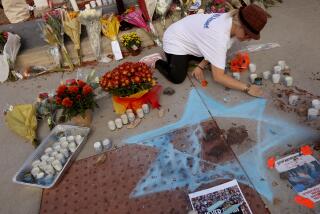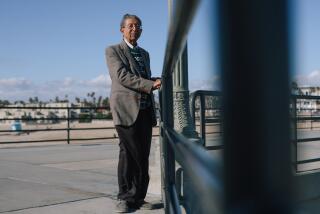Why many Muslims treat Bernie Sanders like a rock star
An Egyptian American woman in a black hijab kicked off the volunteer meeting, invoking God in Arabic as she stood in front of a handwritten poster that read, “Muslims and Arabs for Bernie.”
Volunteers had gathered at a Syrian-Palestinian cafe in Oakland to talk politics over falafel and shakshuka. The few dozen graduate students, tech workers and lawyers strategized on how best to pitch their favorite presidential candidate, a 77-year-old Jewish man raised in Brooklyn.
Vermont Sen. Bernie Sanders “supports Muslims like no other candidate,” the woman, Rusha Latif of San Jose, explained after the April meeting of the group she founded, Bay Area Muslims for Bernie.
The Facebook invitation for the get-together was titled, “Inshallah, Bernie!” — “God willing, Bernie!”
Sanders has maintained a fervent following as he campaigns for the Democratic presidential nomination and tries to attract key voting blocs such as African Americans and Latinos. He has found success among a smaller group rarely on the radar for White House hopefuls: Muslims.
Other Democratic presidential candidates have visited mosques on the campaign trail this year or spoken to Muslim groups. But Sanders has done it first and done it bigger, building on relationships with Muslim communities that took off during his previous presidential campaign, said Youssef Chouhoud, a political science professor at Christopher Newport University who studies the role of Muslims in politics.
“Historically, engaging with Muslims when you’re seeking federal office has been seen as politically dangerous,” Chouhoud said. “Bernie Sanders seems to be doing something different.”
Since February, Sanders has named a Muslim to be his campaign manager, tapped a prominent Muslim Palestinian American activist as a surrogate and visited a Los Angeles mosque to commemorate the victims of a New Zealand terrorist massacre at two Islamic houses of worship.
Last month, he headlined the Islamic Society of North America convention in Houston, where he got a standing ovation for his promise to overturn President Trump’s travel ban blocking most visitors from five predominantly Muslim countries from entering the U.S. It was the first time a presidential candidate addressed the largest and most prominent Muslim gathering in the country, and more than 7,000 people packed in to hear him.
Former Housing and Urban Development Secretary Julian Castro, the only other presidential candidate to speak at the event, followed Sanders, but many in the crowd left after hearing the senator.
Sanders’ campaign representatives said they hope Muslims will help him repeat his 2016 Michigan primary win and capture other states. The campaign credited outreach to Michigan’s large Arab American and Muslim communities — including Arabic campaign ads — as a factor in his win there.
Muslims and Islamic organizations, meanwhile, have sought out Sanders, inviting him to talk to their communities, praising his policy positions and offering endorsements. Many have taken to social media to show their support, using the hashtags #Muslims4Bernie and #InshallahBernie.
Over the summer, Latif, the Bay Area supporter, launched the website “Iftars with Bernie.” The name refers to the meals at sundown that end the daily fast during Ramadan, when extended families and friends take turns eating and praying together in each others’ homes. The website encourages Muslims to share literature about the senator at the dinners.
“Muslims appreciate how he is giving them opportunities to be part of his movement,” said Cynthia Ubaldo, a physical therapist in Columbus, Ohio, who hosted a similar event for Eid, a holiday at the end of Ramadan. She passed out homemade “Muslims for Bernie 2020” pins decorated with stars and crescent moons to her 30 guests.
Sanders isn’t the only White House hopeful to reach out to Muslims. In July, he and five others spoke — by video, livestream or in person — to the Muslim Collective for Equitable Democracy, hosted in Washington by the new Muslim Caucus of America. And South Bend, Ind., Mayor Pete Buttigieg, Hawaii Rep. Tulsi Gabbard and former Texas Rep. Beto O’Rourke, whose national political director is Muslim, have also visited mosques this year.
But representatives of half a dozen Muslim civic groups said the Sanders campaign has done the most to court them.
“Some politicians think just visiting a mosque or speaking to Muslims once is enough. Bernie is doing more, and making us feel like we are in the campaign,” said Fayaz Nawabi, a delegate for the California Democratic Party who lives in San Diego and runs the Facebook page “Muslims for Bernie 2020.”
He pointed to an organizing meeting that Sanders’ campaign manager held at the Houston Islamic convention and a voting outreach webinar this month.
Linda Sarsour, a Palestinian American activist, is flying to Islamic conferences and mosques around the country to speak on Sanders’ behalf as a campaign surrogate. The co-founder of the Women’s March was among the leaders who left the group recently after infighting and accusations of anti-Semitism, which she has denied.
Sarsour says Sanders has attracted followers because of his response to Trump’s statements on Muslims and the conflict in Israel and the Palestinian territories.
The senator “has been outspoken on Palestinian rights,” Sarsour said. “And he has been a big defender” of two Muslim congresswomen who have been the target of Trump’s ire after criticizing him.
“And the fact that he is Jewish American,” Sarsour said, “crushes the stereotype that Muslims and Jews are natural enemies.”
Sanders usually polls among the top three Democratic candidates, with former Vice President Joe Biden and Massachusetts Sen. Elizabeth Warren. He has largely held steady with few gains, and experts said it’s unclear if Muslims voters will make a difference for him or anyone else.
At 3.45 million, the U.S. Muslim population is relatively small for a religious group. National political polls that ask about religion typically don’t have enough Muslims in their samples to make predictions about their policy or voting preferences, said Charlie Cook, a nonpartisan political analyst who has tracked campaigns and elections for more than three decades.
But, Cook said, “When you have the presidency settled by less than 78,000 voters in three states, it is foolish for a party to not go after every constituency in the handful of states that matter the most.”
Muslims are concentrated in urban areas and states including Michigan and Pennsylvania, which, along with Wisconsin, were key in Trump’s 2016 win. Many also live in Texas, New Jersey, New York, Illinois, Florida and California.
A Pew Research Center report in 2017 found that two-thirds of Muslim voters were Democrats, and 13% Republican, numbers that have been steady for a decade. Pew found that about 70% of Muslims in the U.S. are citizens, and of those, just over half voted in the last presidential election.
Emgage, a get-out-the-vote group that focuses on Muslims and hosted the Houston forum where Sanders spoke, recently released a report showing that Muslim voter turnout in Florida, Michigan, Ohio and Virginia increased by 25 percentage points in the 2018 midterm elections compared with four years prior.
“The Muslim community is increasingly aware of the importance of voting, especially in the last few years as Muslims are attacked or scapegoated,” Emgage CEO Wa’el Alzayat said.
The relationship between Sanders and Muslims is a shift from the norm over the last two decades for presidents or for those competing for the Oval Office.
In 1957, Dwight D. Eisenhower dedicated the Islamic Center of Washington, speaking warmly of “traditions of learning and rich culture.” It would be 44 years before a sitting president would again enter an Islamic house of worship in the U.S., according to the White House Historical Assn.
President George W. Bush visited the same center six days after Sept. 11, 2001, amid fears of anti-Muslim violence. Muslims praised him for saying “Islam is peace.” But Bush spent the rest of his presidency facing critics who said he targeted Muslims as suspects with the Patriot Act, the war in Iraq and the opening of a prison for terrorism suspects at Guantanamo Bay Naval Base in Cuba.
President Obama, a Christian born in Hawaii who faced years of conspiracy theories that he was secretly a Kenya-born Muslim, did not visit a mosque during his presidency until his last year in office.
Muslims were frustrated by some of Obama’s policies, said Omar Suleiman, a popular Islamic scholar who runs the Yaqeen Institute outside Dallas. But he noted that Obama’s successor claimed during his campaign that Islam “hates us.”
“You’ve got one party who is represented by Donald Trump, who is very explicit in his anti-Muslim bigotry,” Suleiman said. “And then you have Democrats, who often take Muslim voters for granted, assuming we will vote for them.”
Suleiman, who was in the audience for Sanders’ Houston appearance and travels the U.S. frequently to lecture or lead prayers, said he has noticed an uptick in Sanders supporters in blue and white campaign shirts at his events.
“Muslims are progressive on issues like healthcare, immigration, criminal justice reform, climate change. There is also concern about militarism, there’s concern about Israel and Palestine, and if Muslims will have their civil liberties,” Suleiman said. “People keep telling me that Bernie appeals to them on all these levels.”
More to Read
Get the L.A. Times Politics newsletter
Deeply reported insights into legislation, politics and policy from Sacramento, Washington and beyond. In your inbox three times per week.
You may occasionally receive promotional content from the Los Angeles Times.







